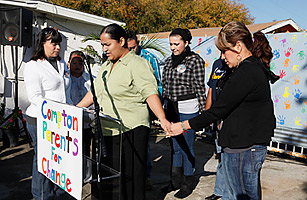
In a barebones basement office in Buffalo, New York, Katie Campos, an education activist, is plotting a revolution. She and her miniscule staff of the education reform advocacy group, Buffalo ReformED, are against incredible odds. In less than a week they are trying to get a controversial law through the New York State Legislature that is known as the Parent Trigger. It’s a powerful nickname for game-changing legislation that would enable parents at any persistently failing school who can gather a majority to fire the principal, fire 50% of the teachers, close the school down — or turn the existing school into a charter school.
Campos and her group are working with some 4,000 frustrated parents like Samuel Radford III, who refuses to accept that as African-Americans, his three sons in Buffalo Public Schools only have a 25% chance of graduating. Radford has voiced his concerns for years and seen nothing improve, so rather than waiting for the district to act, he became vice president of the District Parent Coordinating Council and threw his support behind passing trigger legislation in the state. “This is our chance to not just confront the problem, but be part of the solution,” Radford said. On June 15, Buffalo ReformED plans to fill a bus of parents like Radford and ride to the state capitol in Albany to host an informal hearing on the bill and speak to the members of both the senate and house education committees.
When people first hear about the radical-sounding law they are almost always taken aback. But what they might not know is that any school district in the nation can already shut down failing schools under No Child Left Behind . The Parent Trigger takes the options provided to the school board and hands the power to the parents. Gloria Romero, the now ex-legislator who sponsored the first parent trigger law in California, said it was designed so that if the school district wasn’t doing enough to turn a school around the parents would not have to sit idly by and wait for reform that never came. “These are school districts that are chronically underperforming and yet the school officials have done nothing to turn them around,” Romero told TIME, referring to California’s 1,300-plus persistently failing schools.
The idea for the parent trigger was conceived in 2009 by Ben Austin, a former deputy mayor of Los Angeles and policy consultant at Green Dot Public Schools, a charter school organization. “The way I saw it, if education was going to change, parents had to have a seat at the table where they could make real decisions about real reforms for their kids,” Austin told TIME. Austin decided to start a reform advocacy group called Parent Revolution dedicated to passing the parent trigger legislation. By January 2010, Austin and a feisty crop of paid organizers had knocked on some 4,000 doors, mobilized parents, bused them to Sacramento and into state Congressman’s offices to tell their stories and managed to get the idea cemented into law.
See “Are These End Times For Charter Schools?”
See “K-12 Programs Decline in Popularity.”